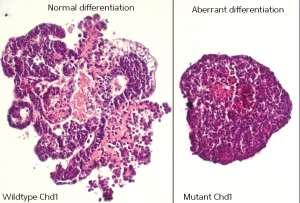Embryonic stem cells from (left) control and (right) mutant Chd1 mice showing normal and aberrant differentiation in vitro, respectively. Credit: P. Piatti et al.
The importance of a chromatin remodeler gene, Chd1, in regulating the ability of embryonic stem cells to develop into other cell types has been revealed in a new study by A*STAR researchers.
Chin Yan Lim and colleagues from the A*STAR Institute of Medical Biology, along with international collaborators, observed that a common post-translational modification called phosphorylation, associated with regulating protein function and signal transmission within the cell, may influence Chd1-dependent changes in cell fate in specific contexts
The remodeling of a complex of DNA, histone proteins and RNA, known collectively as chromatin, within the nucleus of eukaryotic cells, is an essential process for embryonic stem cells to differentiate into other cell types. Chd1 activity is specifically regulated by phosphorylation on the N-terminal region of the protein. The new study shows that when this region is deleted, the result is aberrant differentiation phenotypes.
Lim and the team took an in-depth look using mouse embryonic stem cells. They partially deleted a segment of Chd1 that was responsible for encoding the Chd1 protein, which resulted in a shortened Chd1 protein lacking the N-terminal region. Aberrant differentiation phenotypes were observed through an in vitro model when this truncated protein was expressed in the mouse embryonic stem cells (see image).
In an in vivo model, mice carrying the mutation that removes the N-terminus of Chd1 developed normally, and were viable and fertile. However, embryonic stem cells derived from these Chd1-mutant mice showed the same propensity to differentiate into neuronal-like cells as in the in vitro-generated embryonic stem cells. This suggested to the team that other factors must be at play in an in vivo environment, such as different growth signals, that mask defects caused by the mutation of Chd1.
"Our results indicate that while phosphorylation is not essential to the function of Chd1 in self-renewing embryonic stem cells, changes to Chd1 activity, mediated by phosphorylation, is critical when the cells differentiate," says Lim.
The findings could lead to new ways of manipulating embryonic stem cells in culture. "This work suggests that directed differentiation of embryonic stem cells into clinically relevant cell types in vitro could be fine-tuned by altering the phosphorylation status of chromatin-remodeling factors such as Chd1," says Lim.
More information: "Embryonic stem cell differentiation requires full length Chd1." Scientific Reports 5, 8007 (2015). dx.doi.org/10.1038/srep08007
Journal information: Scientific Reports




















